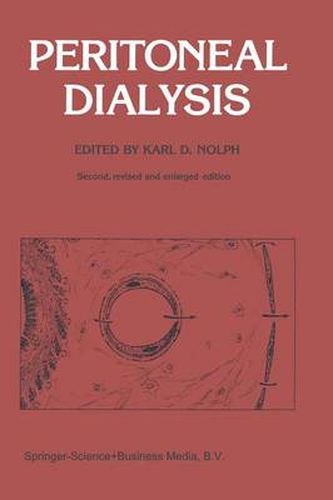Readings Newsletter
Become a Readings Member to make your shopping experience even easier.
Sign in or sign up for free!
You’re not far away from qualifying for FREE standard shipping within Australia
You’ve qualified for FREE standard shipping within Australia
The cart is loading…






This title is printed to order. This book may have been self-published. If so, we cannot guarantee the quality of the content. In the main most books will have gone through the editing process however some may not. We therefore suggest that you be aware of this before ordering this book. If in doubt check either the author or publisher’s details as we are unable to accept any returns unless they are faulty. Please contact us if you have any questions.
Peritoneal dialysis represents an internal technique for blood purification. In this dialyzer the blood path, the membrane, and the dialysate compartment are provided by nature. The developments of chronic peritoneal catheters, auto mated cycling equipment, solution preparation by reversed osmosis, manipula tions of transport with drugs, and the experiences with continuous ambulatory peritoneal dialysis and continuous cycling peritoneal dialysis have increased the interest in peritoneal dialysis. Publications related to peritoneal dialysis exceed 400 annually. The Peritoneal Dialysis Bulletin represents a new journal devoted to peritoneal dialysis developments. The Third International Symposium on Peri toneal Dialysis is to be held in Washington, D.C. in 1984. From this meeting it is likely that an International Society for Peritoneal Dialysis will emerge. This book is meant to provide an overview of the state of the art of peritoneal dialysis. Many clinicians are making extensive commitments to peritoneal dialysis for the first time. Nephrologists, physiologists, pharmacologists, biomedical engineers, and even physicists are involved in studies to better understand peritoneal dialysis. The complexities of peritoneal dialysis and the peritoneal membrane are becoming apparent. Studies of peritoneal dialysis increase under standing of the anatomy and physiology of biological membranes and of factors influencing the passive movement of solutes across the microcirculation and related structures. Peritoneal dialysis provides a ‘window’ to the visceral micro circulation in animals and humans. Peritoneal dialysis may be useful to treat problems other than renal failure.
$9.00 standard shipping within Australia
FREE standard shipping within Australia for orders over $100.00
Express & International shipping calculated at checkout
Stock availability can be subject to change without notice. We recommend calling the shop or contacting our online team to check availability of low stock items. Please see our Shopping Online page for more details.
This title is printed to order. This book may have been self-published. If so, we cannot guarantee the quality of the content. In the main most books will have gone through the editing process however some may not. We therefore suggest that you be aware of this before ordering this book. If in doubt check either the author or publisher’s details as we are unable to accept any returns unless they are faulty. Please contact us if you have any questions.
Peritoneal dialysis represents an internal technique for blood purification. In this dialyzer the blood path, the membrane, and the dialysate compartment are provided by nature. The developments of chronic peritoneal catheters, auto mated cycling equipment, solution preparation by reversed osmosis, manipula tions of transport with drugs, and the experiences with continuous ambulatory peritoneal dialysis and continuous cycling peritoneal dialysis have increased the interest in peritoneal dialysis. Publications related to peritoneal dialysis exceed 400 annually. The Peritoneal Dialysis Bulletin represents a new journal devoted to peritoneal dialysis developments. The Third International Symposium on Peri toneal Dialysis is to be held in Washington, D.C. in 1984. From this meeting it is likely that an International Society for Peritoneal Dialysis will emerge. This book is meant to provide an overview of the state of the art of peritoneal dialysis. Many clinicians are making extensive commitments to peritoneal dialysis for the first time. Nephrologists, physiologists, pharmacologists, biomedical engineers, and even physicists are involved in studies to better understand peritoneal dialysis. The complexities of peritoneal dialysis and the peritoneal membrane are becoming apparent. Studies of peritoneal dialysis increase under standing of the anatomy and physiology of biological membranes and of factors influencing the passive movement of solutes across the microcirculation and related structures. Peritoneal dialysis provides a ‘window’ to the visceral micro circulation in animals and humans. Peritoneal dialysis may be useful to treat problems other than renal failure.